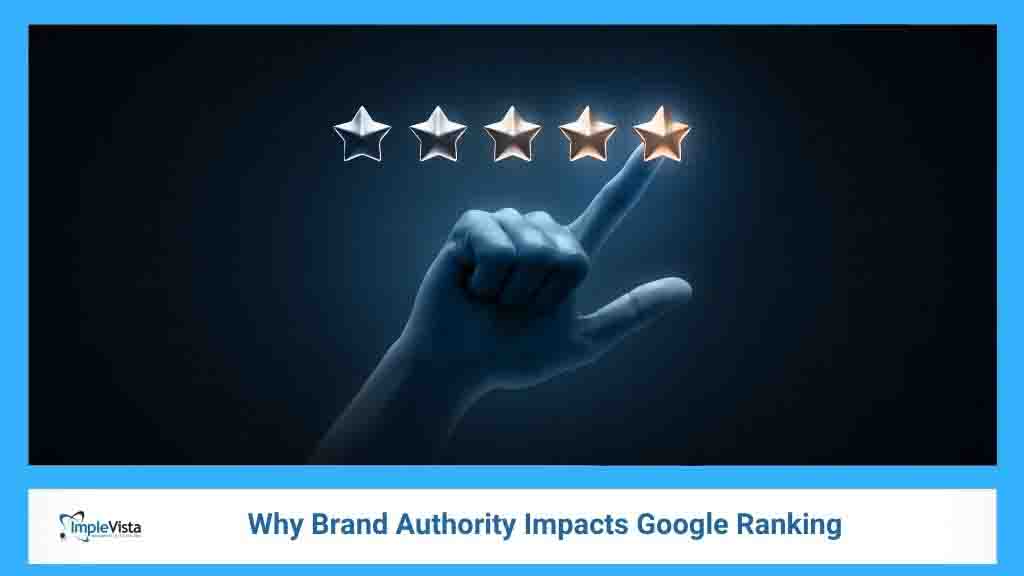In today’s highly competitive digital landscape, simply targeting keywords is not enough to secure a top position in Google search rankings. Google’s algorithm has become smarter, prioritizing not just content but also the credibility behind it. That’s where brand authority comes in.
But what exactly is brand authority, and how does it impact your Google ranking?
Brand authority refers to the trust, expertise, and recognition a business commands in its niche. It influences how users engage with your content, how other websites link to you, and ultimately, how search engines rank your site. From backlinks and branded searches to content relevance and domain strength—brand authority is deeply embedded in SEO.
In this article, we’ll explore why building brand authority is no longer optional—and how it plays a key role in determining your Google search ranking.
What Is Brand Authority in SEO?
Brand authority is the perceived credibility and influence your business holds in your specific industry. It’s built over time through:
- High-quality, helpful content
- Consistent brand messaging
- Expert recognition
- User trust and engagement
Search engines reward this trust. When Google sees a website consistently referenced, cited, and searched by name—it begins to view that brand as a reliable source of information. That means better rankings, more impressions, and stronger organic visibility.
How Brand Authority Affects Google Ranking
Google’s algorithm considers hundreds of signals when ranking pages. Some of the most influential authority-related factors include:
1. Branded Search Volume
When users specifically search for your brand (e.g., “Implevista SEO services”), it signals to Google that people trust your business. High branded search volume often correlates with stronger rankings, even for non-branded keywords.
2. Backlink Quality & Quantity
Authoritative brands attract backlinks from other respected sites. These backlinks act like votes of confidence and are a known ranking factor in Google’s algorithm.
🔗 Learn more about this on Implevista Digital’s SEO service page
3. Content Depth and Relevance
Established brands typically produce deeper, more valuable content. Google favors this kind of content because it better serves users.
📖 Check out SEO Basics for Bangladeshi Entrepreneurs to see how authoritative content is crafted.
4. User Engagement Metrics
When users trust a brand, they’re more likely to click, stay longer, and engage with the content. These behavior signals can indirectly boost your Google ranking.
How to Build Brand Authority for Better Google Search Ranking
1. Consistency Is Key
Whether you’re posting on your website or social media, consistent messaging helps users—and Google—understand your expertise.
2. Leverage Thought Leadership
Publishing expert opinions, case studies, or insights establishes you as an industry leader. For example, Implevista’s post on The Impact of Page Experience on SEO demonstrates this.
3. Get Featured on High-Authority Sites
Contributing guest posts or interviews on respected websites not only boosts backlinks but also enhances your brand’s perceived value.
4. Build a Strong Internal Linking Structure
Connect relevant blog posts and service pages across your site. This helps search engines understand your site hierarchy and reinforces topical authority.
How Google Measures Brand Authority
Although not a direct ranking factor, brand authority influences signals Google uses to rank content. Here’s how:
| Metric | Description |
| Branded Click-Through Rate | Higher CTR for branded keywords implies user preference and trust. |
| Brand Mentions (unlinked) | Even unlinked brand mentions contribute to perceived authority. |
| Backlink Profiles | Quality of referring domains enhances domain authority. |
| Knowledge Panel Presence | Brands featured in Google’s Knowledge Graph are often seen as authoritative. |
| Engagement Time | Long time-on-site and low bounce rate are indirect ranking signals. |
The Link Between Brand Authority and Content Trustworthiness
High-ranking content often shares common traits: it’s useful, backed by data, and published by a credible source. If your brand is perceived as an expert, users are more likely to:
- Click on your content
- Share it with others
- Link back to it
This is why Google’s E-E-A-T (Experience, Expertise, Authoritativeness, and Trustworthiness) guidelines align perfectly with brand authority.
How Implevista Builds Brand Authority
At Implevista, our strategy revolves around helping clients create a reputable digital presence that Google rewards. Here’s how:
- We build high-quality blogs like Top Digital Marketing Trends in Bangladesh
- Implement schema markup to enhance credibility
- Focus on UX and Core Web Vitals for better site trust
Through consistent branding, expert content, and ethical SEO, Implevista has become a trusted partner for digital growth.
Top 7 Strategies to Improve Brand Authority and Google Ranking
- Create Expert-Led, Original Content
- Get Cited on Reputable Platforms
- Encourage Branded Searches
- Utilize Customer Testimonials
- Collaborate with Influencers or Industry Experts
- Maintain Technical SEO and Site Health
- Invest in Long-Term PR & Digital Presence
Authority Is the New SEO Power Move
Your Google ranking doesn’t just depend on keyword usage or backlinks anymore. It depends on how trustworthy and recognized your brand is in your industry. As search engines evolve, brand authority becomes the differentiator between content that gets buried and content that shines on Page 1.
Invest in your brand’s voice, amplify your presence, and earn the trust of both users and search engines. The more authority you build, the higher your content will rank.
The Rising Importance of Brand Authority in Google Search
As digital branding becomes more essential and marketing budgets face increased scrutiny, building brand authority has never been more critical. With online competition intensifying across industries, brands must go beyond traditional SEO and understand the triggers behind a Google search. Is it a viral video on TikTok? An ad seen during a favorite streaming show? Or maybe a mention in a podcast?
Today’s SEO isn’t confined to keywords alone—it’s influenced by the external signals that guide a user’s search behavior. Creating strategic, audience-focused content becomes essential in shaping how your brand is discovered and trusted online. Every blog post, landing page, or social update becomes part of a larger narrative—one where you position yourself as a credible, authoritative voice in your field.
Let’s explore how you can segment your strategy, leverage new tools like Google’s Search Generative Experience (SGE), and optimize for local relevance to boost both your search visibility and brand influence.
Segmenting Your Content Strategy for Topical Authority
Throwing random content online and hoping something sticks is no longer effective. In an era where consumers are overwhelmed with information, generic content blends into the background. If you want to capture your audience’s attention and stand out in the search results, you need a targeted, topic-driven content strategy.
Segmentation is the process of organizing content based on specific audience interests and needs. Rather than creating content for everyone, smart brands focus on areas where they have both expertise and relevance—what we call “right-to-own” topics.
To establish topical authority, ask yourself:
- What questions is your audience asking?
- Which problems can your brand solve better than competitors?
- Where does your brand have unique experience or perspective?
By aligning your content with these topics, you’re not only speaking directly to different customer segments but also showing Google that your site is an expert in key subject areas. Tools like SEMrush, AnswerThePublic, or Google’s People Also Ask can help you discover relevant topics and related search queries. But remember—quality over quantity is key. Prioritize content that provides genuine value, not just content that chases traffic.
Understanding Brand Perception with Google’s Search Generative Experience (SGE)
As you work to gain brand and topic authority, SGE (Search Generative Experience) has emerged as a powerful ally. Google’s SGE uses AI to generate insightful answers directly on the search page. It synthesizes reviews, articles, and various content formats to present a comprehensive overview of a brand or topic.
This new format gives you a clear window into how your brand is perceived in real-time search environments.
Here are some AI prompts you can use with tools like Google SGE, ChatGPT, or Microsoft Copilot:
- “What do people say about [Brand Name]’s services?”
- “How is [Brand Name] reviewed by customers?”
- “Is [Brand Name] considered reputable in its industry?”
- “What are the pros and cons of working with [Brand Name]?”
Once you’ve gathered these insights, evaluate:
- Are there gaps between how your brand is perceived and how you wish to be seen?
- What consistent patterns or feedback are emerging?
- How do you compare with your competitors in search visibility?
- Are there emerging opportunities to strengthen your reputation?
By analyzing SGE results, your team can uncover overlooked strengths or weaknesses. These insights are invaluable for shaping both content and keyword strategy. Unlike traditional metrics, SGE focuses on content depth, intent, and uniqueness—which makes building trust and experience-driven content essential.
Finding Your Authority “Swim Lane” in Search
SGE also helps brands identify their content niche—the space where you can confidently say, “We are the experts here.” This is your swim lane—a focused topic area where your topical authority, expertise, and brand trust come together to drive consistent traffic.
Rather than trying to compete in broad, saturated markets, focus on where you add the most value. When your content aligns with your brand’s real strengths and industry knowledge, search engines are more likely to reward it with visibility.
Experts predict SGE will continue shaping how people interact with search results. While some forecast a 20–30% drop in clicks for certain sectors, especially eCommerce, the actual impact will depend on how Google presents results in real time.
The Role of Local Authority in Google Search Ranking
For businesses that operate in specific regions—or even globally with local markets—local authority plays a crucial role in search performance.
User behavior and intent vary dramatically by location. For example, someone searching for beachwear in California will see different results than someone in Minnesota. Google factors in:
- Store proximity
- Same-day pickup (BOPIS) availability
- Product stock in local stores
- Promotions and shipping speeds
Even in what looks like organic traffic in Google Analytics, platforms like Google Shopping rely heavily on Google Merchant Center feeds. If your feed isn’t optimized for local performance, you risk losing ground to larger competitors with stronger fulfillment options.
To enhance local visibility, businesses should:
- Keep Google Business Profile listings up to date
- Create localized landing pages for key cities or regions
- Optimize product availability and delivery messaging
- Ensure accurate category mapping and product data in Merchant Center
If you’re an eCommerce brand, location-specific optimization ensures that your content and products appear where they’re most relevant—and where they convert best.
Creating Content for Both Humans and Machines
Today’s SEO isn’t just about keywords—it’s about semantic meaning, content structure, and user satisfaction. This means creating content that not only appeals to human readers but also aligns with how machines interpret language.
To do this effectively:
- Use structured data (Schema.org) to help search engines understand your content
- Break content into digestible sections with clear headings
- Include context-rich, long-tail keywords
- Focus on helpful, unique, experience-backed insights
At Implevista, we integrate both technical SEO and storytelling to ensure your content performs across the board. Whether it’s for human eyes or AI systems like SGE, your content should aim to be accurate, valuable, and trustworthy.
📌 Explore how Implevista Digital helps optimize for Core Web Vitals
Strategic Recommendations: Build Authority, Not Just Traffic
To stand out in the modern SERP (Search Engine Results Page), focus on building brand trust and niche authority through the following:
- Define your topical swim lanes – Stick to areas where you have real value.
- Use SGE insights – Monitor how your brand appears in AI-generated search results.
- Invest in local SEO – Tailor your presence to where your customers live and search.
- Create content with intent – Focus on solving problems, not just ranking.
- Blend human empathy with machine-readability – Use SEO-friendly structures while being authentic.
Frequently Asked Questions (FAQ)
Q: Why is brand authority important for SEO?
Brand authority builds trust, drives engagement, and improves how search engines perceive your website, leading to better rankings.
Q: What is Google’s Search Generative Experience (SGE)?
SGE is Google’s AI-powered search model that delivers summarized, conversational results based on user queries.
Q: How can I find my brand’s swim lane?
Analyze your expertise, review SGE insights, and identify where your brand offers unique value that others don’t.
Q: What’s the difference between local SEO and general SEO?
Local SEO focuses on optimizing for geographic relevance, helping your business appear in region-specific searches.
Q: How can SGE affect my Google ranking?
SGE influences how users interact with your content in search. AI-generated summaries can highlight trusted brands, boosting visibility.
Q: What tools can help me assess brand perception?
Use platforms like Google SGE, social listening tools, or prompt-based AI to gather consumer sentiment.
Q: How do I optimize content for both humans and machines?
Use clear headings, bullet points, internal links, and structured data. Focus on readability and value.
Q: Can a small business build brand authority?
Yes. By producing helpful, focused content and earning trust, even smaller brands can dominate niche topics.
Q: What is topical authority?
It’s the recognition your site gains for being an expert in specific subject areas—critical for long-term SEO success.
Q: How can Implevista help with SEO and authority?
We offer content creation, SEO audits, technical optimization, and strategy development to build brand trust and rankings.
Q: What is brand authority in SEO?
Brand authority refers to how trusted, credible, and recognized your brand is online. It influences search engine rankings and user trust.
Q: Does Google consider brand authority in its algorithm?
While not a direct ranking factor, brand authority influences signals like backlinks, branded searches, and user engagement that affect rankings.
Q: How do I increase my Google ranking through brand authority?
Publish expert content, earn high-quality backlinks, encourage branded searches, and maintain a consistent digital presence.
Q: Is brand authority more important than keywords?
Both are important, but brand authority offers long-term SEO value beyond keyword trends.
Q: How long does it take to build brand authority?
It depends on your niche and efforts, but consistent content, PR, and SEO typically show results in 3–6 months.
Q: Can small businesses build brand authority?
Absolutely. Sharing real-world expertise and focusing on niche content can establish strong authority over time.
Q: What role do backlinks play in brand authority?
They’re essential. Quality backlinks from authoritative sites boost your domain credibility and Google ranking.
Q: Does Google penalize sites with low authority?
Not directly, but low-authority sites may struggle to rank against established competitors.
Q: How can Implevista help with brand authority?
We offer strategy, content, SEO, and technical support to help grow your visibility and trustworthiness.
Q: What tools can I use to measure brand authority?
Try Ahrefs, SEMrush, or Moz to track domain authority, backlink profile, and branded keyword visibility.
Ready to Elevate Your Google Ranking Through Brand Authority?
At Implevista, we specialize in helping businesses in Bangladesh and beyond build strong brand presence and visibility through smart content, local SEO, and data-backed strategies.
- 🔍 Explore our SEO Services
- ✉️ Contact us for a customized SEO audit
- 📬 Subscribe to our Implevista Blog for insights on E-E-A-T, branding, and digital growth





